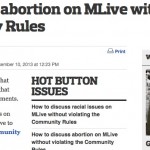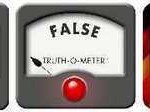09 Feb 2014
Anonymous comments and the mythical Facebook fix: Jen Eyer’s TEDx talk

In this video, Jen Eyer makes the case for anonymous comments. I have been a fan of her work with comment moderation for several years; she made MLive’s comment area into what I hoped cleveland.com would be when it grew up. MLive isn’t perfect. But perfection isn’t possible — not even if you “require” real
30 Jan 2014
5 tips for print newsrooms shifting to online focus

If the announcements from Digital First Media and the San Francisco Chronicle are any indication, the rest of America’s newspapers are waking up to the reality that Advance Digital figured out a few years ago: Future success in news depends on adapting to online, and that means cutting loose from the print mindset. Steve Buttry,
29 Jan 2014
Welcome to the digital future, Digital First and San Francisco Chronicle

In the last few days, the tide seems have turned in America’s newspaper newsrooms. The San Francisco Chronicle’s managing editor, Audrey Cooper, talked in detail about the paper’s plans to revamp its focus: “You look around this newsroom and it looks like it did in that photo in 1958,” she said. “The only thing that
27 Jan 2014
Indianapolis Star gets wits scared out of it by ridiculous demonic possession story

Offered as an object lesson in reporting: This credulous Indianapolis Star story about the demonic possession of a family. An editor for the Star promoted the piece on Twitter like this: Delusion or demonic possession? You decide. http://t.co/jDtwLav31Q via @indystar — Eric Dick (@IndyStarEric) January 26, 2014 No, no, no. That’s like saying “Earth —
26 Jan 2014
Plain Dealer dumps PolitiFact … and about time, too

The Plain Dealer and its stable-mate, the Northeast Ohio Media Group, are finally doing the right thing about PolitiFact. They’re quitting. It’s for the wrong reason, but I’ll count my blessings. The operation’s Ted Diadiun reports: I should note that although some editors shared my dismay over the Truth-O-Meter, that did not figure in the
23 Jan 2014
Homeopathic journalism, or the rise of the single-source story

I’ve learned that one thing, at least, hasn’t changed in the nearly 40 years since I started journalism school: the reluctance of young students to interview strangers. Some of my colleagues at Kent State, where I’m now teaching a Media Writing class, were talking about assigning interviews in a basic reporting class. Students almost invariably
14 Jan 2014
CJR flings another handful of poo at nola.com and Advance Digital

I’m assuming there’s a dartboard in the offices of the Columbia Journalism Review that has Advance Digital or one of its top bosses in the bullseye, because at least two of its staff — Ryan Chittum and Dean Starkman — seem to be determined to poke as many holes in the Newhouse company’s plans as
11 Dec 2013
Journalism ethics: Why we are responsible for the mud-slinging in our comments

If journalists have an ethical duty to protect those who provide content, what does that mean in practical terms? I’ve seen much discussion of a duty of care regarding journalists who, as part of their job, take physical risks or cover events that leave psychological trauma. At the higher levels of journalism, where foreign correspondents
07 Dec 2013
Journalism ethics: How a hierarchical code would apply to a real-life decision

Jimmy Olsen rushes into the newsroom waving a CD-ROM. “Got it,” he says, almost out of breath. Lois Lane snatches the disk and slides it into the side of her MacBook, firing up its Audacity sound-editing program. She opens the first file on the CD. After a second or two of quiet static, a woman’s
04 Dec 2013
Journalism ethics: Duties to our audience, our subjects, and ourselves

When one of my reporters was leaving to become a manager at another paper, I gave him this advice: Make the readers your first priority, your staff second, and everything else a distant third. Putting aside the clues that may offer to why I’m no longer a working journalist, the key thing is that I
